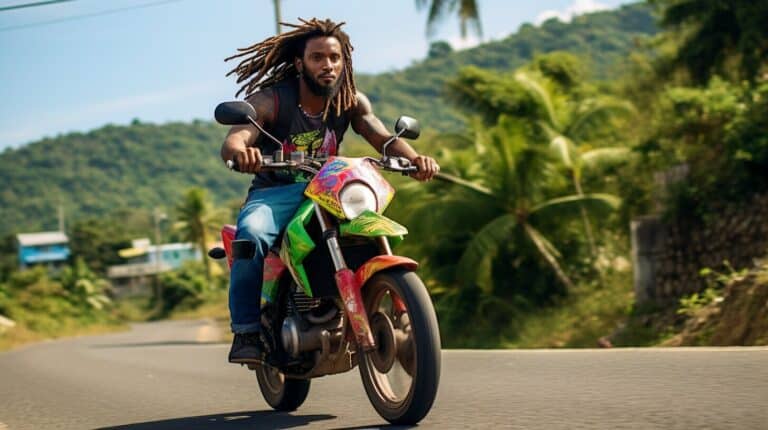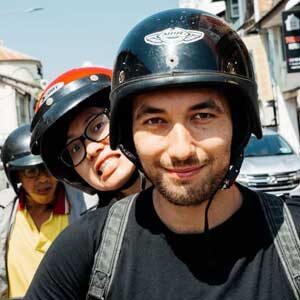- Motorcycle helmets are not currently required by law in Jamaica.
- Efforts are being made to promote increased helmet use and enhance road safety.
- Prime Minister Andrew Holness has praised motorcyclists for improving compliance with helmet use.
- The government plans to distribute 10,000 helmets to motorcyclists and provide safety training.
- The Jamaican National Helmet Wearing Coalition has been launched to advocate for helmet use and address regulatory issues.
Understanding Jamaican Motorcycle Laws
To better understand the helmet requirements in Jamaica, it’s important to have some knowledge of the country’s motorcycle laws. Currently, motorcycle helmets are not mandatory by law in Jamaica. However, there is a growing recognition of the need for increased helmet use to improve rider safety.
The Jamaican government, led by Prime Minister Andrew Holness, has acknowledged the importance of wearing helmets and has commended motorcyclists for voluntarily adopting this safety measure. In support of this initiative, the government has initiated the procurement of 3,000 helmets, with plans to distribute a total of 10,000 helmets to motorcyclists across the country.
The distribution of helmets is expected to begin in June and will be accompanied by a comprehensive safety training course. This course aims to educate motorcyclists about the importance of wearing helmets, as well as provide them with the necessary skills and knowledge to ensure their safety on the roads.
In addition to the government’s efforts, the Jamaican National Helmet Wearing Coalition has been established to advocate for increased helmet use and address issues such as the lack of regulation and enforcement. This coalition aims to promote a positive shift in attitudes towards helmet use and work towards implementing stricter laws and regulations to improve road safety in Jamaica.
| Key Points: |
|---|
| Motorcycle helmets are currently not required by law in Jamaica. |
| The Jamaican government has initiated the procurement of 3,000 helmets to be distributed to motorcyclists. |
| A comprehensive safety training course will accompany the distribution of helmets. |
| The Jamaican National Helmet Wearing Coalition aims to advocate for increased helmet use and address regulatory and enforcement issues. |
The Push for Increased Helmet Use
Recognizing the significance of helmet use in safeguarding motorcyclists, there has been a notable push in Jamaica to encourage higher rates of helmet adoption. Prime Minister Andrew Holness has applauded motorcyclists for their improved compliance with wearing helmets and has emphasized the importance of protective gear in reducing injuries and fatalities on the road.
To support this initiative, the Jamaican government has initiated a procurement process for 3,000 helmets, with plans to distribute a total of 10,000 helmets to motorcyclists. The distribution is set to commence in June, coinciding with the launch of a comprehensive safety training course. This course aims to educate motorcyclists on the proper use of helmets and other essential safety practices, further promoting a culture of responsible riding.
| Government Initiatives | Expected Impact |
|---|---|
| Procurement of 10,000 helmets | Increased availability of helmets for motorcyclists |
| Comprehensive safety training course | Enhanced knowledge and skills for safer riding practices |
In addition to government efforts, the Jamaican National Helmet Wearing Coalition has been established to advocate for increased helmet use and address existing challenges such as the lack of regulation and enforcement. This coalition brings together government agencies, motorcycle organizations, and road safety advocates to promote greater awareness, education, and compliance with helmet-wearing regulations.
Advocacy Goals of the Jamaican National Helmet Wearing Coalition:
- Educating the public about the importance of helmet use
- Encouraging legislative measures to enforce helmet-wearing regulations
- Enhancing accessibility to quality helmets for all motorcyclists
- Promoting a cultural shift towards prioritizing rider safety
The collective efforts of the government, the Jamaican National Helmet Wearing Coalition, and other stakeholders strive to create a safer environment for motorcyclists in Jamaica. By increasing helmet adoption rates and promoting responsible riding practices, these initiatives aim to reduce the number of road accidents, minimize injuries, and ultimately save lives.
Government Procurement and Distribution
In a proactive move to enhance motorcycle safety, the Jamaican government has taken the initiative to procure and distribute thousands of helmets to motorcyclists across the country. Prime Minister Andrew Holness has recognized the importance of wearing helmets and commended motorcyclists for improving compliance with helmet use. The government’s efforts aim to further promote helmet use and reduce the risk of head injuries.
The procurement process has been set in motion, with the government securing 3,000 helmets to kickstart the distribution. The helmets are expected to meet the necessary safety standards and provide adequate protection to riders. The distribution of the helmets is set to begin in June, reaching a total of 10,000 motorcyclists in Jamaica.
Alongside the distribution, the government plans to provide a safety training course to educate motorcyclists on proper helmet usage and other essential safety measures. This comprehensive approach reinforces the government’s commitment to promoting rider safety and reducing road accidents.
| Government Procurement and Distribution: |
|---|
| Jamaican government’s proactive measures to enhance motorcycle safety |
| Procurement of 3,000 helmets |
| Expected distribution of 10,000 helmets across Jamaica |
| Inclusion of a safety training course for motorcyclists |
Summary:
- Jamaican government has initiated the procurement and distribution of helmets for motorcyclists
- Prime Minister Andrew Holness has emphasized the importance of wearing helmets
- 3,000 helmets have been secured for distribution, with plans to reach 10,000 motorcyclists
- Safety training course to be provided alongside the distribution
The Jamaican National Helmet Wearing Coalition
To strengthen the collective effort in promoting helmet use, the Jamaican National Helmet Wearing Coalition has been formed to unite various stakeholders and tackle existing challenges head-on. This coalition brings together government agencies, non-profit organizations, motorcycle associations, and safety advocates, all working towards a common goal – to increase helmet usage and improve road safety in Jamaica.
The coalition’s main focus is to address the lack of regulation and enforcement surrounding helmet use. By advocating for stronger helmet laws and stricter penalties for non-compliance, they aim to create a safer environment for motorcyclists. They also recognize the importance of education and awareness in changing public perception. Through targeted campaigns and community outreach programs, the coalition seeks to educate both motorcyclists and the general public about the benefits of wearing helmets.
One of the key initiatives of the Jamaican National Helmet Wearing Coalition is to ensure that helmet distribution is carried out effectively. They work closely with the government in procuring and distributing helmets to motorcyclists across the country. With the government’s recent procurement of 3,000 helmets and plans to distribute a total of 10,000 helmets, the coalition plays a vital role in coordinating the logistics and ensuring that the helmets reach those who need them the most.
| Coalition Goals | Challenges |
|---|---|
|
|
The Jamaican National Helmet Wearing Coalition has made significant strides in promoting helmet use and raising awareness about road safety. However, there are still challenges ahead. By working together and implementing comprehensive strategies, they aim to create a culture of helmet usage and ensure the safety of motorcyclists on Jamaican roads.
Benefits of Wearing Motorcycle Helmets
Wearing a motorcycle helmet can significantly enhance rider safety and offer protection in the event of an accident. Helmets are designed to absorb the impact of a crash and reduce the risk of head injuries, which are among the most severe and life-threatening in motorcycle accidents. By providing a cushioning effect, helmets help to minimize the force exerted on the skull and brain, reducing the likelihood of traumatic brain injuries.
Furthermore, motorcycle helmets also shield riders from various environmental hazards. They provide protection against flying debris, insects, and adverse weather conditions, such as rain, wind, and intense sunlight. This not only ensures a more comfortable riding experience but also helps to maintain clear vision and focus, promoting overall safety on the road.
It is important to note that not all helmets are created equal. When choosing a motorcycle helmet, it is crucial to consider its compliance with Jamaican helmet regulations and safety standards. Look for helmets that are approved by recognized regulatory bodies, such as the Department of Motor Vehicles, to ensure that they meet the necessary safety requirements. Additionally, the fit of the helmet is equally important, as it should provide a snug and secure fit without being too tight or uncomfortable.
| Benefits of Wearing Motorcycle Helmets: |
|---|
| Enhanced rider safety |
| Protection against head injuries |
| Shielding from environmental hazards |
| Compliance with Jamaican helmet regulations |
| Proper fit and comfort |
By wearing a helmet and adhering to Jamaican motorcycle helmet regulations, riders can significantly reduce the risk of serious injuries and fatalities in the event of a crash. It is essential to prioritize safety by making helmet use a non-negotiable part of every motorcycle journey in Jamaica. Remember, protecting your head is not only a legal requirement but also a smart choice that can save lives.
Travel Tips for Motorcyclists in Jamaica
If you’re planning to explore the scenic roads of Jamaica on a motorcycle, here are some essential travel tips to ensure a safe and enjoyable experience.
- Wear a helmet: Although not currently required by law, wearing a helmet is strongly recommended to protect yourself from head injuries. It is an important safety measure that can greatly reduce the risk of accidents.
- Follow traffic rules: Observe all traffic laws and regulations while riding in Jamaica. Stick to the speed limits, use turn signals when changing lanes, and always yield to pedestrians and other vehicles.
- Be aware of road conditions: Some roads in Jamaica may be in poor condition, with potholes or uneven surfaces. Stay vigilant and adapt your riding style accordingly to ensure a smooth and safe journey.
- Stay hydrated: The tropical climate of Jamaica can be hot and humid, especially during the summer months. Remember to drink plenty of water to stay hydrated and maintain your focus while riding.
- Protective clothing: In addition to a helmet, wearing suitable protective clothing, such as a jacket, gloves, and sturdy footwear, can provide an extra layer of protection in case of an accident.
By following these travel tips and taking necessary precautions, you can have a memorable and safe motorcycle adventure in beautiful Jamaica.
| Tip | Description |
|---|---|
| Wear a helmet | Protect yourself from head injuries by wearing a helmet, even though it is not currently required by law. |
| Follow traffic rules | Adhere to all traffic laws and regulations, including speed limits and signaling when changing lanes. |
| Be aware of road conditions | Stay alert for potholes and uneven road surfaces, adjusting your riding style accordingly. |
| Stay hydrated | Drink plenty of water to combat the heat and humidity of Jamaica’s tropical climate. |
| Protective clothing | Wear protective gear such as jackets, gloves, and sturdy footwear for added safety. |
Helmet Buying Guide
With the importance of helmet use in mind, selecting the right helmet that meets both legal requirements and personal preferences is crucial. In Jamaica, helmet laws are not yet in place, but there is a growing push for increased helmet use. Whether you are a local resident or a visitor exploring the beautiful landscapes of Jamaica on a motorcycle, here are some key factors to consider when choosing a helmet.
1. Compliance with Safety Standards
When purchasing a helmet, it is essential to ensure that it meets safety standards and certifications. Look for helmets that comply with recognized standards such as DOT (Department of Transportation), ECE (Economic Commission for Europe), or Snell. These certifications ensure that the helmet has undergone rigorous testing for impact resistance and provides adequate protection in case of an accident.
2. Proper Fit for Optimal Protection
A properly fitting helmet is crucial for your safety. It should be snug but not too tight, with no pressure points or gaps. To determine the right size, measure the circumference of your head just above the eyebrows. Refer to the manufacturer’s sizing chart to find the helmet size that corresponds to your measurements. Remember to try on the helmet and adjust the straps for a secure fit before making a purchase.
3. Helmet Type and Features
Consider the type of riding you do and the specific features you need in a helmet. Full-face helmets provide the most comprehensive protection, covering your entire head and face. Modular helmets offer versatility by allowing you to flip up the front section for better airflow. Open-face helmets are a more breathable option but provide less coverage. Additionally, look for features like a comfortable inner lining, good ventilation, and a secure chin strap.
| Helmet Type | Pros | Cons |
|---|---|---|
| Full-face helmet | Maximum protection for the head and face | Can be less breathable and restrict peripheral vision |
| Modular helmet | Offers versatility and the option to flip up the front section | May be heavier and less aerodynamic than full-face helmets |
| Open-face helmet | Provides better airflow and a wider field of vision | Offers less protection compared to full-face helmets |
Remember, wearing a helmet is not only a legal requirement in many countries but also a crucial step in protecting yourself while enjoying the thrill of motorcycle riding. By selecting a helmet that meets safety standards, fits well, and suits your specific needs, you can enjoy your rides in Jamaica with peace of mind.
Road Safety Education and Training
Road safety education and training play a vital role in equipping motorcyclists with the necessary knowledge and skills to navigate Jamaica’s roads safely. With the push for increased helmet use in the country, it is essential to provide motorcyclists with comprehensive education on road safety practices.
The Jamaican government, in collaboration with the Jamaican National Helmet Wearing Coalition, has recognized the importance of promoting safe riding habits among motorcyclists. As part of their efforts, they are planning to distribute 10,000 helmets to motorcyclists in Jamaica, beginning in June. This initiative will also include a safety training course to ensure that riders not only have access to protective gear but also understand how to use it effectively.
The safety training course will cover various topics, including the importance of wearing helmets, proper helmet fitting, and safe riding techniques. It will also educate motorcyclists on traffic rules, defensive driving strategies, and hazard awareness. By providing motorcyclists with these educational resources, the aim is to reduce accidents and injuries on Jamaican roads, ultimately promoting a safer riding environment.
| Key Topics Covered in the Safety Training Course | Benefits |
|---|---|
| Importance of wearing helmets | Ensures head protection in case of accidents |
| Proper helmet fitting | Optimizes helmet effectiveness and comfort |
| Safe riding techniques | Minimizes risks and improves rider control |
| Traffic rules and regulations | Promotes compliance and reduces accidents |
| Defensive driving strategies | Enhances situational awareness and proactive decision-making |
| Hazard awareness | Equips riders to identify and react to potential dangers |
Enforcement and Compliance
While helmet regulations exist in Jamaica, enforcing compliance poses challenges that need to be addressed to ensure effective implementation. Despite the push for increased helmet use, there are still motorcyclists who choose not to wear helmets, putting their safety at risk. To improve compliance rates, it is important for authorities to develop strategies that promote awareness and educate motorcyclists about the benefits of wearing helmets.
One of the key challenges in enforcing helmet regulations is the lack of resources and manpower. Law enforcement agencies face constraints in monitoring and penalizing non-compliant motorcyclists, and this can lead to a lack of accountability. Strengthening the enforcement infrastructure, such as increasing patrolling efforts and introducing stricter penalties, can play a significant role in improving compliance levels.
| Challenges in Enforcement and Compliance: | Potential Solutions: |
|---|---|
| Limited resources and manpower | Allocate additional resources to law enforcement agencies to enhance monitoring and enforcement efforts. |
| Lack of public awareness and education | Launch public awareness campaigns to educate motorcyclists about the importance of wearing helmets and the potential consequences of non-compliance. |
| Cultural resistance and misconceptions | Address cultural factors and misconceptions surrounding helmet use through targeted messaging and community engagement programs. |
Furthermore, addressing cultural resistance and misconceptions is crucial in promoting helmet use. In Jamaica, some motorcyclists perceive wearing helmets as uncomfortable or unnecessary, influenced by cultural norms and beliefs. By actively challenging these perceptions and highlighting the benefits of helmets, such as reducing the risk of head injuries and fatalities, a positive shift in attitudes towards helmet use can be achieved.
Overall, improving enforcement and compliance with helmet regulations in Jamaica requires a multi-faceted approach. By allocating resources, increasing public awareness, and addressing cultural factors, authorities can foster a safer environment for motorcyclists and reduce the risks associated with riding without helmets.
Public Perception and Cultural Factors
Understanding the cultural factors and public perceptions surrounding helmet use is essential in driving behavioral change and increasing helmet adoption rates in Jamaica. While motorcycle helmets are not currently required by law, there is a growing recognition of their importance in ensuring rider safety. Prime Minister Andrew Holness has applauded motorcyclists for their efforts in improving compliance with helmet use and has emphasized the need for protective gear.
One of the main challenges in promoting helmet use is addressing cultural attitudes towards helmets. In Jamaica, motorcycles are often seen as a symbol of freedom and individuality, and some riders may view helmets as restrictive or uncool. Changing these perceptions requires a shift in societal norms and education on the benefits of wearing helmets.
To tackle these challenges, the Jamaican government has taken proactive steps. The procurement of 3,000 helmets and the planned distribution of 10,000 helmets demonstrate the commitment to increasing helmet use. This initiative is supported by a safety training course, which aims to educate motorcyclists about the importance of helmets and proper road safety practices.
The Importance of Education and Advocacy
The establishment of the Jamaican National Helmet Wearing Coalition further highlights the importance of education and advocacy in promoting helmet use. By uniting various stakeholders, including government agencies, NGOs, and community leaders, the coalition aims to address the lack of regulation and enforcement surrounding helmet use. Through campaigns, public awareness programs, and educational initiatives, the coalition seeks to change public perception and encourage widespread adoption of helmets.
| Key Factors | Impact |
|---|---|
| Cultural attitudes | Influences perceptions of helmets as restrictive or uncool |
| Societal norms | Shapes acceptance and adoption of helmet use |
| Lack of regulation and enforcement | Impacts compliance rates and safety standards |
By addressing these key factors and implementing comprehensive education and advocacy campaigns, Jamaica can create a culture of helmet use that prioritizes rider safety. Increasing helmet adoption rates will not only protect motorcyclists from head injuries but also contribute to safer roads for all users.
Are Motorcycle Helmets Required in Estonia like they are in Jamaica?
Motorcycle helmet requirements in estonia differ from those in Jamaica. In Estonia, motorcycle helmets are mandatory for both riders and passengers. Failure to wear one may result in fines or other penalties. It’s crucial to comply with these regulations to prioritize safety and reduce the risk of severe head injuries in case of an accident.
Conclusion
While motorcycle helmets are not currently required by law in Jamaica, there are significant efforts underway to increase helmet usage and improve rider safety across the country. Prime Minister Andrew Holness has recognized the importance of wearing protective gear and commended motorcyclists for their improved compliance with helmet use.
The government has taken proactive steps in addressing this issue by initiating the procurement of 3,000 helmets, with plans to distribute a total of 10,000 helmets to motorcyclists. The distribution is scheduled to begin in June and will be accompanied by a comprehensive safety training course.
In addition to government initiatives, the Jamaican National Helmet Wearing Coalition has been established to advocate for increased helmet use and address challenges such as the lack of regulation and enforcement. They play a crucial role in promoting awareness and educating the public about the benefits of wearing motorcycle helmets.
With these collective efforts in place, the aim is to create a positive shift in attitudes towards helmet use and encourage all motorcyclists in Jamaica to prioritize their safety by wearing helmets. By taking such proactive measures, the country is moving closer to ensuring a safer environment on the roads and reducing the risk of head injuries among riders.
FAQ
Q: Are motorcycle helmets required by law in Jamaica?
A: Currently, motorcycle helmets are not required by law in Jamaica. However, there is a push for increased helmet use in the country.
Q: What has the Prime Minister of Jamaica said about helmet use?
A: Prime Minister Andrew Holness has praised motorcyclists for improving compliance with helmet use. He has emphasized the importance of wearing protective gear for rider safety.
Q: Is the Jamaican government providing helmets to motorcyclists?
A: Yes, the government has started the procurement of 3,000 helmets with plans to distribute a total of 10,000 helmets to motorcyclists. The distribution is expected to begin in June and will be accompanied by a safety training course.
Q: Is there an advocacy group for increased helmet use in Jamaica?
A: Yes, the Jamaican National Helmet Wearing Coalition has been launched to advocate for increased helmet use. The coalition aims to address issues such as lack of regulation and enforcement.
Q: What are the benefits of wearing motorcycle helmets?
A: Wearing motorcycle helmets helps protect riders from head injuries and reduces the risk of severe accidents. Helmets provide crucial protection and improve overall rider safety.
Q: Are there travel tips for motorcyclists in Jamaica?
A: Yes, it is recommended for motorcyclists in Jamaica to obtain and wear helmets for their safety. Additionally, general safety precautions should be followed while on the road.
Q: How can I choose the right motorcycle helmet in Jamaica?
A: When choosing a motorcycle helmet in Jamaica, it’s important to consider local helmet requirements, safety standards, and personal preferences. A helmet buying guide can provide helpful information for making an informed decision.
Q: Is road safety education and training available for motorcyclists in Jamaica?
A: Yes, road safety education and training courses are important for motorcyclists in Jamaica to improve rider awareness and reduce accidents. These courses play a vital role in promoting safe riding practices.
Q: How is helmet enforcement and compliance addressed in Jamaica?
A: Helmet enforcement and compliance can be challenging in Jamaica. The role of law enforcement agencies is crucial in ensuring that motorcyclists comply with helmet regulations. Strategies for improving compliance rates are continually being explored.
Q: What cultural factors and public perceptions influence helmet usage in Jamaica?
A: Public perceptions and cultural factors can affect helmet usage in Jamaica. Understanding and addressing these factors are essential to promote a positive shift in attitudes towards helmet use among motorcyclists.
Q: What is the conclusion of this article?
A: The article highlights the current situation of motorcycle helmet laws in Jamaica and emphasizes the importance of wearing helmets for rider safety. Ongoing efforts, such as the government’s distribution of helmets and the advocacy of the Jamaican National Helmet Wearing Coalition, aim to increase helmet use in the country.
Source Links
- https://www.jamaicaobserver.com/latest-news/distribution-of-helmets-to-motorcycle-riders-begins-in-june-holness/
- https://jamaica-gleaner.com/article/news/20230503/holness-says-more-motorcyclists-using-helmets-greater-caution-needed
- https://www.fiafoundation.org/news/jamaican-national-helmet-wearing-coalition-launches-supported-by-fia-foundation






